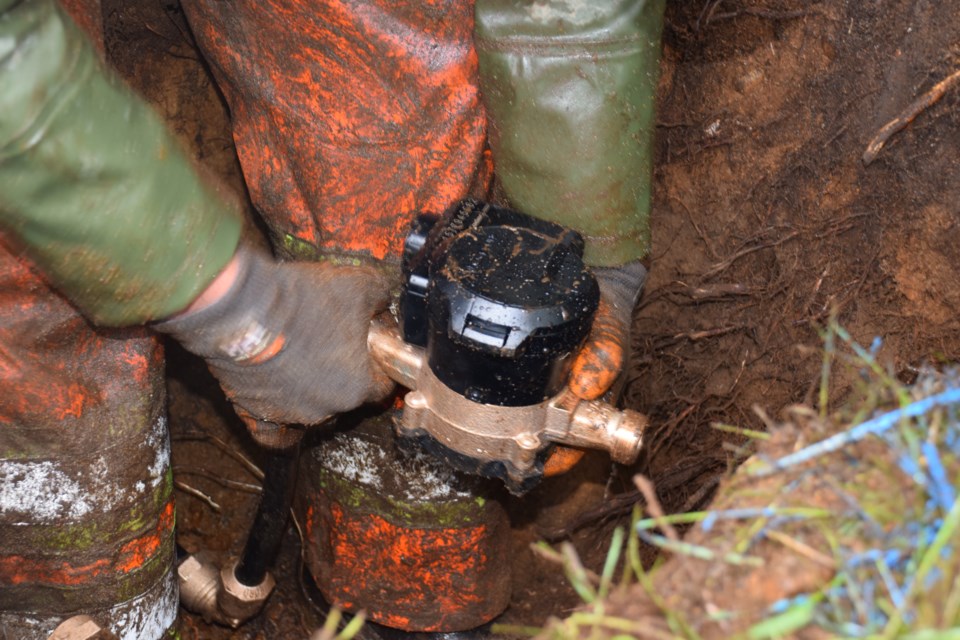The water metering of the Chapman water system has an end in sight, following new provincial funding.
shíshálh Nation is among “nineteen small, rural and First Nations communities” in B.C. set to receive nearly 15,000 new automated water meters that could help save 1.5 billion litres of water a year.
As part of a pilot program to help small communities and local water suppliers track and manage water use and mitigate the impact of drought, a provincial press release states that the funding will cover up to 100 per cent of eligible costs.
Specific to the Coast, shíshálh Nation will receive $3,188,663, which will provide 550 new or replacement water meters.
Water metering in adjacent Sechelt is in progress and has already proven successful at detecting leaks within the Chapman Creek Water System, catching the attention of residents.
SCRD communication manager Aidan Buckley confirmed that once water meters have been installed in the shíshálh Nation Government District, the entire Chapman water system will be metered.
Brittny Anderson, Minister of State for Local Governments and Rural Communities, told Coast Reporter the new meters are expected to be installed by March 2027, and said completing metering of the Chapman water system is “an absolutely incredible milestone for the Sunshine Coast.”
She explained that metering is an important way to help people reduce costs and measure water use, benefiting residents, businesses and communities.
“It's incredible how well these meters are able to detect leaks, Anderson said. “A lot of times, people aren't aware that there are potentially leaks but with a water meter, you're able to identify that pretty easily … which is really important, particularly in the face of drought conditions and climate change.”
Once the meters are installed, they are expected to help reduce water use by up to 30 per cent. “That means more water stays in rivers and lakes to support fish and ecosystems, with less money spent on building new water systems,” said the release.
The release says the $50-million provincial investment could help save up to 1.5 billion litres of water each year, the equivalent of a day’s worth of drinking water for 750 million people, 37.5 million showers or washing 30 million loads of laundry.
Examples of how the meters help conserve water include providing people with an incentive to use less and identifying where leaks happen, which will lead to lower water bills, fewer costly upgrades to water systems, and more water available during emergencies.
The program also includes research that will study the benefits and investigate challenges and opportunities associated with water metering in small communities.
“This is a much-needed and welcomed initiative for First Nations in rural and remote communities who continue to grapple disproportionately with the rippling effects of the climate crisis, and who also face water scarcity in their territories, said Regional Chief Terry Teegee, BC Assembly of First Nations, on behalf of the First Nations Leadership Council, in the release.
“With increasingly frequent droughts occurring throughout B.C., continued and sustained investments from the Province is vital to support First Nations with watershed security through data collection, monitoring and management.”
“People in small and rural communities deserve reliable, affordable water services,” said Randene Neill, Minister of Water, Land and Resource Stewardship, in the release. “By installing these new water meters, we’re helping communities track their water use, save money and prepare for dry seasons. This is about building stronger, more resilient communities in British Columbia.”
“This investment will give families and businesses peace of mind knowing they are only paying for the water that they use,” said Ravi Kahlon, Minister of Housing and Municipal Affairs, in the release. “It will also help communities and First Nations save clean drinking water and cut down on unnecessary maintenance. A win-win for people and the planet.”
“Drinking water is an incredibly precious resource,” said Anderson in the release. “Small and rural communities in B.C. face higher financial and management capacity challenges, and water metering helps communities identify leaks, conserve drinking water, and keep costs down for businesses and residents.”
Jordan Copp is the Coast Reporter’s civic and Indigenous affairs reporter. This reporting beat is made possible by the Local Journalism Initiative.
Words missing in article? Your adblocker might be preventing hyperlinked text from appearing.



